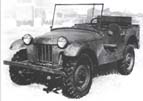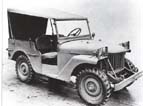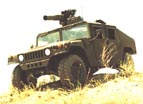Model/Dates: |
Picture: |
Description: |
Bantam
Pilot Model1940 |
 |
The original "Jeep", built by the American Bantam Car Company
of Butler, Pennsylvania in just 49 days under contract with the U.S. Army, delivered on 23
Sep 1940. Featured rounded front fenders, hood, and grille. Headlights
mounted to the tops of the fenders. Willys and Ford also provided prototypes to
compete against the Bantam for a follow-on production contract with the Army. |
| Willys Quad 1940 |
 |
The "Quad" was Willys' prototype model, delivered to the Army
on 13 Nov 1940. Although heavier and more powerful, it looked virtually identical to
the Bantam (why?, because Willys and Ford were both given access to Bantam's blueprints by
the U.S. Army, under protest by Bantam, of course!). |
| Ford Pygmy 1940 |
 |
The "Pygmy", Ford's prototype, was delivered to the Army in Dec 1940 for
testing against the Bantam and Willys prototypes. It was similar to the Willys and
the Bantam, except that it was powered by a Ford tractor engine. Other unique
features included the flat hood, vertical tube flat front grille, and recessed headlights
behind the grille. |
Bantam
BRC-401941 |
 |
In March 1941, the Army contracted with Bantam, Willys, and Ford to each
build and deliver 1,500 vehicles. Bantam produced the BRC-40, which featured a
vertical tube flat front grille, flat front fenders and hood, and headlights mounted on
either side of the hood. A total of 2,675 BRC-40's were produced by the end of 1941.
|
Willys
MA1941 |
 |
The MA was Willys' follow-on model as part of that 1,500-vehicle Army
contract. It was a mirror image of the Bantam design (BRC-40), except more rugged
and more powerful, resulting in the MA being selected by the Army as the "basic
version". Willys would soon be awarded a contract for full-scale production of
the Model MB! |
| Ford GP 1941 |
 |
Ford's follow-on model to satisfy their 1,500-vehicle share of the Army
contract. Very similar in appearance to their Pygmy prototype model. Contrary
to popular belief, "GP" did not stand for "General Purpose". GP
was a Ford engineering term, "G" for a government contract vehicle, and
"P" for 80-inch-wheelbase Reconnaissance Car. Ford produced a total of 4,456 GPs
during 1941 |
Willys MB
&
Ford GPW1942-1945 |
 |
The "standardized" Jeep. Because of Willys' limited
production capacity, the Army contracted with Ford to build Jeeps to the Willys
pattern. The MB and GPW featured a stamped metal grille with recessed headlights,
flat fenders and hood front, and the Willys 4-cyl "Go-Devil" engine. Over
640,000 produced. Although slightly different, all parts are interchangeable between
the MB and the GPW. |
Ford GPA
Amphibious1942-1943 |
 |
Here's an interesting looking Jeep! Basically, the GPA was a squarish hull
wrapped around a GPW, with a power take-off for the propeller. Even though it
wasn't as maneuverable as the services had wanted, nearly 13,000 GPAs were produced for
the military. |
| M38 (MC) 1950-1952 |
 |
The M38 was based on the civilian model CJ-3A, but upgraded for military
use. It featured flat fenders, one-piece windshield, bottom-mounted wipers, and an
air vent at bottom center of windshield frame. Military upgrades included a
stronger frame and suspension, a 24-volt electrical system, and full-floating rear axle. |
| M38A1 (MD) 1952-1968 |
 |
Rounded front fenders, contoured hood, two-piece windshield, top-mounted
windshield wipers, new "Hurricane" F-Head 134 I4 engine. This is the model
that inspired the CJ-5. Differed from the CJ-5 in that it had a stronger frame and
suspension, reversed front spring shackles, standardized GI instruments, and 24-volt
electrics. |
| M170 1954-1964 |
 |
Probably the rarest Jeep ever produced, the M170 was a stretched M38A1.
Only about 6,500 were produced, many outfitted as field ambulances. One
unique feature was that the spare tire was mounted inside the body on the passenger side,
to allow stretchers to extend over the tailgate. Inspiration for the civilian
version CJ-6. |
| M151 1959-1978 |
 |
The M151 "Mutt" (Military Unit Tactical Truck) was tested and
prototyped by Ford throughout the 1950s. It was manufactured by Willys Motors (later
Kaiser Jeep), AM General, General Motors, and Ford. This Vietnam-era Jeep
featured a split windshield and a horizontally-slotted stamped steel front grille. |
| M715/725 1967-1969 |
 |
The M715 was based on the J-series civilian pick-up. The M725 had
the same drive train and nose, but a different cab/cargo area. Both trucks were rated
at 1¼ tons. Shown here is a 1968 Kaiser M725 outfitted as an ambulance. |
| HMMWV 1983-pres |
 |
The Highly Mobile Multi-Purpose Wheeled Vehicle (HMMWV) is the
military's current
generation multi-purpose utility vehicle; manufactured by AM General and powered by a 6.2L
fuel-injected V-8 diesel. It isn't referred to as a "Jeep"
at all, but it figured it would show how far we've come since the
Bantam. Other features of the HMMWV include an aluminum body, 4-wheel
independent suspension, geared hubs, full-time 4WD, and Central Tire Inflation System
(CTIS) which allows the operator to change tire pressure while the vehicle is in motion.
|